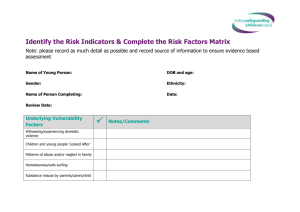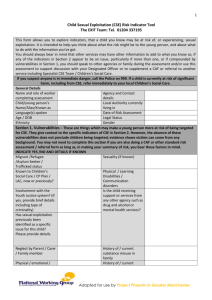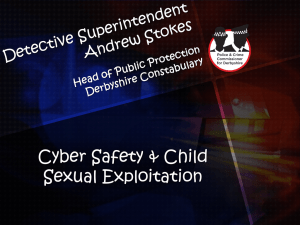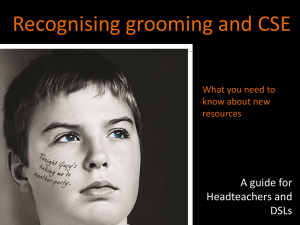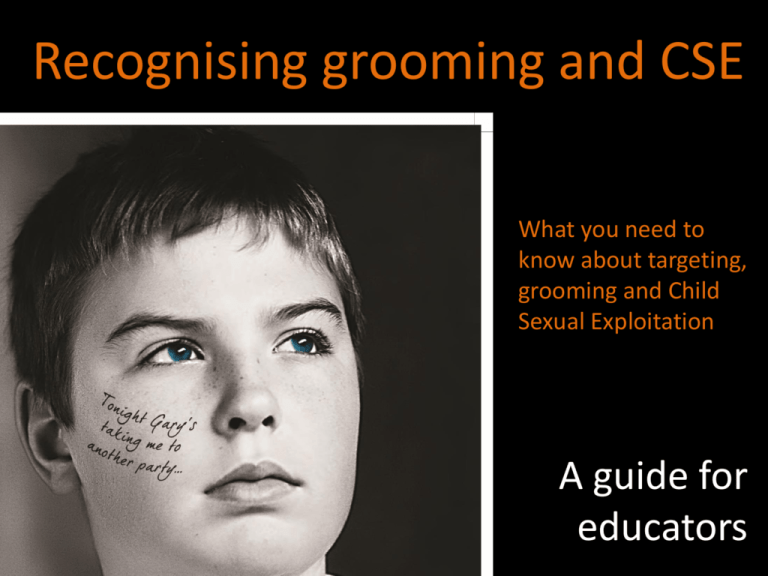
Recognising grooming and CSE
What you need to
know about targeting,
grooming and Child
Sexual Exploitation
A guide for
educators
Before you go any further:
• Fill in the survey – which helps us to plan training in the future
You need to know:
•
•
•
•
•
•
The grooming line
Sexting
Targeting and disrupting
CSE and vulnerability factors
Consent to sex
Reporting
All family professionals working in Staffordshire today
need to keep up to date with developments
in CSE to tackle this growing problem
You need to:
Be confident
and knowledgeable about spotting the signs of CSE,
someone being ‘targeted’ and
of
‘groomed’ and know what to do about it
understand the support available to schools
understand emerging issues and themes about CSE , including
sex
consent to
Why more CSE and grooming
awareness?
• Child sexual exploitation affects thousands of children and young
people across the UK every year – and it’s happening in Staffordshire
• A new multi-agency public campaign from February will raise
public awareness of CSE. A new outcomes framework is developing next
year and every agency will be required to measure with regards to CSE.
• Because it’s everyone’s responsibility
give professionals the vital tools needed to:
‘Grooming’ is now a criminal offence
What is it?
Grooming is when someone convinces a child that they are a safe
and trustworthy person for the purpose of sexually exploiting
them. A child will not always understand this is happening.
This can be through a friendship or a boyfriend/girlfriend through
manipulation - ‘’A ‘’relationship’’
It can happen:
• In person
• Via mobiles or ONLINE
‘Matt thought he knew’
Courtesy of Barnardo’s
A focus on targeting…
What the offender does…
•
•
•
•
•
Observes the child/young person, usually with a number of
others – either online or offline
Selection of child young person
Be-friending - being nice, giving gifts, caring, taking an
interest, giving compliments, etc
Gaining and developing trust
Sharing information about young people between other
abusive adults
How can you spot a child being targeted
Stay alert to changes in behaviour:
1) Befriending – Perpetrator will offer a young person a
‘reward’ or payment in exchange for sexual acts
2) Alienation from family and friends
3) Opportunistic targeting and grooming
Watch - What targeting looks like
Disrupting ‘Targeting’ - how to help the
child to ‘walk away’
Offline:
• Encouraging parents to talk to their child through a warm and
trusting relationship
• Online privacy settings
• A child needs to know they can talk to an adult they you trust
• Using the computer in a family room
Online:
• Online privacy settings
• Don’t give out personal and private details
• E-safety, sexting and cyberbullying (e.g. ‘’trolling’’) awareness
Sexting
… is the transmission of explicit images
.. It’s illegal
..it often leads to more serious exploitation
It’s priority that every professional understands
sexting and supports pupils to make the right
choices
•
•
•
Watch the videos that you can also use for young people
Know about the ‘Zip It’ app and parent guide to help the child’s online
safety
www.staffsscb.org.uk/sexting
Sexting
• Schools have new powers to seize and search an electronic
device is there is a good reason to
• Find out more from the ‘Sexting’ resource at or ask your
Designated Safeguarding Lead
• Videos for young people and a link to an app to help young
people to take control of their online conversations.
• All at : www.staffsscb.org.uk/sexting
Child Sexual Exploitation is child abuse
Perpetrators of CSE recognise vulnerability, and develop exploitative
relationships; further compounding the child’s vulnerability.
A child may think they are in a consensual relationship because they get
affection, attention or gifts in sex.
Relationships that appear to be ‘’loving’’ can change significantly, so that
the child experiences fear, deception, coercion or violence. They are not
in control. They have no choice.
Victims:
• Any child of any age
• Any background
• Any gender or sexual orientation
• Any vulnerability
Child Sexual Exploitation
Because they are targeted when they’re young, most victims:
• Don’t understand what a healthy relationship is
• May fail to recognise they are being abused
• May feel forced to send sexual images of themselves or have sex
• Most perpetrators:
• Use their power – physical, financial, emotionalover the child to sexually and emotionally abuse
Vulnerability/Risk Factors
•
•
•
•
•
•
•
•
•
•
History of abuse
Living in chaotic family environment
Living in residential care, hostel, B&B or being homeless
Gang association either through relatives, peers, intimate
relationships or neighbourhood
Lacking friends from the same age group
Not engaging in education/training or employment
Unsure about their sexual orientation or unable to disclose
sexual orientation to their families
Learning disabilities
Young carer
Recent bereavement or loss
Victims -under- reported cases:
•
Young people with a disability
Read: Research into increasing understanding of how to meet
the needs of children and young people with learning disability
•
Boys and young men
Look at : BLAST website and resources for boys experience CSE
•
Lesbian, gay, bisexual and transgender or questioning
sexuality
Read: Findings of scoping exercise into practitioners knowledge of
CSE
• Minority groups
And all are vulnerable online
Spotting the signs of CSE
Remember the mnemonic S.A.F.E.G.U.A.R.D.
WATCH
Why it’s important, remember S.A.F.E.G.U.A.R.D
Consent to sex
•
Someone consents only if they agree by choice and they have the freedom
and capacity to make that choice.
•
Consent may be given to one type of sexual activity but not another.
•
Consent can be withdrawn at any time during sexual activity and each time
activity occurs.
•
Whilst it is accepted that most adolescents become sexually active in their
teens, the legal age of consent is 16.
•
Sex with a child of 12 or under is statutory rape.
•
Can still be exploited even if they say yes -whatever their age
Consent to sex
Myth : Children and young people are not being
exploited if they are 16 or over.
Do you know that any child under the age of 18, male or
Reality: It can take place even when the victim can legally consent
to sex - if their ability to give consent is affected by influence of
drugs, threats of violence, grooming or a power imbalance
between victim and perpetrator. This is why a 16- or 17-year-old
can be sexually exploited even though they are old enough to
consent to sexual activity.
Watch:
Consent is everything
(Thames Valley Police)
Consent to sex
Someone cannot agree to sex if they are:
•
•
•
•
Under the influence of drink or drugs
Asleep or unconscious
Suffering from a medical condition, mental health problem or
have a learning disability
Old enough to consent (16+)
•
There are many other situations to consider…. Please discuss.
You’re not alone… knowing what to do
•
Raise your own CSE development needs in supervision.
Do you have a concern about a child?
•
Your Designated Safeguarding Lead can support access to multi
- agency support
•
Your DSL will support you to report
Reporting it
With your DSL you can:
1) Help the child yourself - Complete an Early Help
Assessment. Education Safeguarding Advice Service on 01785
895836 can help you.
2) Decide if the child is at risk - Complete a Risk Factor Matrix.
Education Safeguarding Advice Service on 01785 895836 can help you.
3) Does the child require immediate referral? If not, the Education
Safeguarding Advice Service on 01785 895836 can help you.
Refer those at immediate risk to First Response or Staffordshire Police on
101.
4) Is the child is immediate danger? Ring Staffs police on 999
Now tell us what you think…
• Fill in the short survey again to:
•
•
Tell us your training and development needs
now
See how effective these messages are
Remember to raise your own CSE development needs in
your supervision
New resources
• From March 2016, SSCB will no longer fund
Chelsea’s Choice
• Instead, schools can access a range of effective
and age-appropriate resources :
•
•
•
•
Sexting videos and apps for young people
Guides for parents to talk online safety
New ‘the signs of CSE’ video
Birmingham BAIT resources

